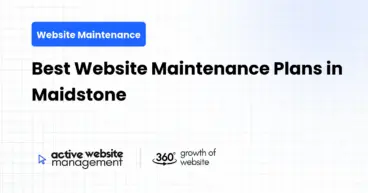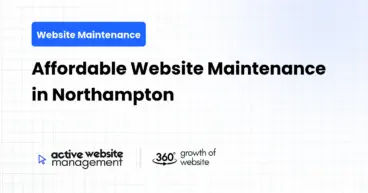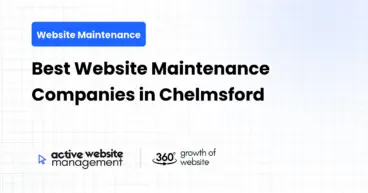December 23, 2024
8 min read
When it comes to running a website, maintaining it properly is just as important as building it in the first place. A well-maintained website ensures a smooth user experience, better SEO performance, and improved security. However, choosing the right website maintenance plan can be overwhelming. With so many options available, how do you know which one is best suited for your needs?
In this comprehensive guide, we will explore the seven key questions you should ask before selecting a website maintenance plan. This will help you make an informed decision that will keep your website running smoothly for years to come.
1. What Services Are Included in the Maintenance Plan?
When choosing a website maintenance plan, one of the first questions to ask is: what exactly is covered in the plan? Not all website maintenance packages are created equal, and you need to ensure the services provided align with your business goals.
Some common services included in website maintenance plans are:
- Regular Software Updates: Keeping your website’s CMS (Content Management System), plugins, and other software up to date is essential to ensure optimal performance and security. Outdated software can become vulnerable to security breaches.
- Website Backups: Regular backups ensure that your website can be restored in case of any issues like hacking or data loss.
- Security Monitoring and Patches: A good website maintenance plan will include regular monitoring to detect any security threats and ensure that patches and updates are applied promptly.
- Content Updates: If you have a content-heavy website, regular content updates are essential for engaging visitors and improving SEO.
- SEO Monitoring: Maintaining your SEO efforts is important for keeping your website visible in search engine results. Your plan should include SEO audits and adjustments.
- Performance Optimization: Regular website performance checks help in ensuring that your site loads quickly and efficiently, which is vital for user satisfaction.
Be sure to ask for a detailed breakdown of these services when reviewing potential plans. This will help you understand what’s included and ensure there are no surprises later on.
2. How Often Should My Website Be Updated?
The frequency of updates is an important consideration when selecting a maintenance plan. Websites need regular updates, but how often will depend on the type of website and your business needs.
- Small Business Websites: For small websites, updates might be needed monthly. This includes software updates, content refreshes, and minor security patches.
- E-commerce Websites: E-commerce sites require more frequent updates due to the dynamic nature of product listings, payment security concerns, and inventory changes. Weekly updates may be necessary.
- Blog or News Websites: If your website is content-heavy, it will require frequent content updates to keep it fresh and engaging. These sites may also need SEO monitoring more frequently.
When choosing a maintenance plan, ask how often they perform these updates and whether the frequency fits your needs. Some providers may offer daily, weekly, or monthly updates, depending on the scale and complexity of your site.
3. What Is the Cost of the Maintenance Plan?
Understanding the cost structure is crucial when choosing a website maintenance plan. Maintenance costs can vary greatly depending on the type of services offered, the complexity of your website, and the level of support required.
Generally, website maintenance costs can be broken down into three categories:
- Hourly Rate: Some maintenance services charge an hourly rate. This can be beneficial for websites that need sporadic updates or have occasional issues. However, it may be hard to predict your monthly costs.
- Flat-Rate Subscription: Some companies offer a flat-rate monthly or yearly subscription for ongoing maintenance. This option is typically better for businesses that require consistent updates and support.
- Custom Pricing: Larger, more complex websites may require a customized plan based on specific needs. This could include additional features like custom development, unique security measures, or advanced SEO services.
Before making a decision, it’s important to clarify exactly what is included in the price. Ensure there are no hidden costs, such as emergency support fees or additional charges for specific updates.
Check out our guide onmanaging website costs.
Don’t Just Maintain Your Website—
Grow It using Active Website Management! Don't Wait for Growth—Accelerate It with Active Website Management
4. How Do I Know if My Website Needs Regular Backups?
Backups are a critical aspect of website maintenance, and you should never underestimate their importance. Websites are vulnerable to many issues, including server crashes, hacking attempts, and human error.
When evaluating a maintenance plan, ask the following:
- How often will backups be performed?
- Are backups stored securely, and can they be restored quickly?
- Does the plan offer both full-site and incremental backups?
Ideally, backups should be taken regularly (at least weekly or even daily for large websites) and stored in multiple locations. Some maintenance plans include automatic backups, ensuring that you never have to worry about manually backing up your site.
5. What Security Measures Are Included?
Website security is one of the most important aspects of maintenance. Hackers are constantly looking for vulnerabilities, and a lack of regular security checks can leave your site exposed.
A comprehensive website maintenance plan should include the following security measures:
- Malware Scanning: This scans your website for any signs of malware or malicious code. If detected, it can help remove the threat before it causes serious damage.
- SSL Certificate Updates: SSL certificates are necessary for ensuring secure communication between users and your website. Maintenance plans should include updates to these certificates when needed.
- Firewall Protection: A web application firewall helps protect your site from attacks like DDoS (Distributed Denial of Service) and brute force login attempts.
- Security Patches: As new vulnerabilities are discovered, patches must be applied to your website’s software. Regular updates ensure that your website stays protected.
Ask potential providers what specific security measures are included in their maintenance plans, and ensure they align with your security requirements.
Active Mnagement Website(AWM) improve website security.
6. How Can I Handle Unexpected Issues and Support Requests?
Unexpected issues are inevitable in the world of websites, and how quickly you can resolve them depends on the quality of support offered by your maintenance plan. You need to ensure that the plan provides adequate support channels for any issues that may arise.
Here are some questions to consider:
- What support channels are available? Is support available via email, phone, or live chat? The more access you have to support, the better.
- What is the response time? Ensure the plan specifies how quickly the support team will respond to urgent issues. A fast response time can be crucial for fixing issues before they affect your business.
- Is there a guaranteed uptime? For websites with high traffic, uptime is critical. Check if the provider offers any uptime guarantees or service level agreements (SLAs).
Many maintenance plans offer tiered support options. If you need immediate support 24/7, you may need to choose a more premium plan.
7. What Are the Long-Term Benefits of a Website Maintenance Plan?
While it’s important to consider the immediate costs and features of a maintenance plan, it’s equally important to evaluate the long-term benefits. A well-maintained website is an asset that can grow your business over time.
Some key long-term benefits include:
- Improved Website Performance: Regular performance checks ensure that your website loads quickly and efficiently, which is essential for user experience and SEO.
- Better SEO: Ongoing content updates, SEO audits, and optimizations will help your website rank higher in search engine results.
- Reduced Downtime: Regular maintenance reduces the chances of unexpected downtime, which could hurt your reputation and cause you to lose customers.
- Enhanced Security: With regular security updates and monitoring, the risk of a security breach is minimized.
Ultimately, a website maintenance plan provides peace of mind, knowing that your website is always functioning at its best.
Conclusion
Choosing the right website maintenance plan is an essential step toward ensuring that your website runs smoothly, securely, and efficiently. By asking these seven important questions, you can make an informed decision that aligns with your needs and budget.
Remember to assess the services offered, the frequency of updates, the costs involved, and the level of support provided. With a solid maintenance plan in place, you can focus on growing your business while your website remains secure, optimized, and always up-to-date.
Additionally, active website management (AWM) is an essential factor that goes hand-in-hand with a robust maintenance plan. AWM involves the ongoing monitoring, management, and optimization of your website to ensure that it continues to deliver the best user experience, adhere to industry standards, and meet your evolving business objectives. By integrating AWM into your website maintenance strategy, you ensure that all technical, design, and performance aspects of your site are proactively handled, minimizing potential issues and maximizing your site’s effectiveness in the long run.
With a combination of regular maintenance and active website management, you can rest assured that your website will remain competitive, secure, and highly functional for years to come.






